The Iliad (Penguin Classics) Read online
Page 25
Meanwhile Agamemnon led the whole party of senior (90) advisers to his huts and had a heartening meal served up. They helped themselves to the good things spread before them and, when their hunger and thirst were satisfied, the old man Nestor, whose wisdom had won the day before, expounded his plan. He had their interests at heart as he rose and addressed them:
Nestor recommends conciliating Achilles (1.275)
‘Most glorious Agamemnon son of Atreus, lord of men, with you my speech begins and it will end with you. You are ruler over many people, for whose guidance Zeus granted you the sceptre and the authority to take decisions. So you, above all, must both (100) give and listen to advice and carry out the suggestions that others may feel bound to put forward in the common interest. You will get the credit, whatever the proposal.
‘Now I will tell you how things seem to me – because no one will come up with a better analysis than mine. I formed it at the time and have not altered it, since the moment, Olympian-born Agamemnon, you infuriated Achilles by going to take the young girl Briseis from his hut. We were all against it; and I for one did my best to dissuade you. But your arrogant temper got the better (110) of you, and you dishonoured a man of the highest distinction, whom the gods themselves respected, by taking and keeping his prize. Even at this late hour, then, we should consider how to talk him round and appease him with soothing gifts and winning words.’
Agamemnon lord of men replied:
‘Venerable sir, your account of my blind folly is the truth. Deluded I was – I for one cannot deny it. The man Zeus takes to his heart and honours – as he now does that man to the point of crushing the Greeks – is worth a whole army. But since I gave in to a lamentable impulse and committed this act of (120) blind folly, I am willing to make amends and give him limitless compensation.
Agamemnon’s gifts
’Before you all, I list the prestigious gifts I have in mind: seven tripods untarnished by the flames; ten talents of gold; twenty cauldrons of gleaming copper; and twelve powerful racehorses whose speed has made winners of them. Why, with nothing more than the prizes they have won for me, a man would not be badly off or short of precious gold.
(130) ’I will give him seven women skilled in arts and crafts, women of exceptional beauty that I chose out of the spoils when he captured thriving Lesbos. I will give him these and, with them, the woman I took from him, the daughter of Briseus. Moreover, I shall give him my solemn oath that I have never been in her bed and slept with her, as men and women do. All these gifts shall be put in his hands at once.
‘Later, if the gods permit us to sack Priam’s great town, let him come in with us when we are sharing out the spoils, load his ship with gold and bronze to his heart’s content, and pick (140) out twenty Trojan women for himself, the loveliest he can find after Greek Helen.
‘And if in due course we get back to Argos, the most fertile of all lands, he can become my son-in-law, and I will honour him as I do Orestes, my beloved son, who is being brought up there in the lap of luxury. I have three daughters in my strong palace, Chrysothemis, Laodice and Iphianassa. Of these he shall choose for his own whichever he likes best and take her back to Peleus’ house, without the usual bride-gifts. Indeed, I will give him gifts, generous ones, more than anyone has ever given with his daughter.
‘Not only that, but I will give him seven prosperous towns: (150) Cardamyle, Enope and grassy Hire; holy Pherae and Antheia with its deep meadows; beautiful Aepeia and Pedasus rich in vines. They are all near the sea, in the farthest part of sandy Pylos. Their people are rich in flocks and cattle. They will honour him with their gifts as though he were a god and, being under his authority, give him rich dues.
‘All this I will do for him the moment he abandons his anger. Let him surrender. We all know it is because Hades is so implacable and unyielding that he is more hated by mortals than any (160) other god. Yes, let him submit to me, since I rank higher than he does and am older as well.’
Nestor the Gerenian charioteer replied:
‘Most glorious Agamemnon son of Atreus, lord of men, nobody could say your offer to lord Achilles was not generous. Very well then, we must now send an urgent deputation to Achilles’ hut. I will nominate the men myself, and they must not refuse the duty. First of all Phoenix, dear to the gods, must lead the way, then great Ajax and godlike Odysseus. Of the heralds, (170) Odius and Eurybates are the men to go with them. Now fetch water for our hands and call for silence, so that we can pray to Zeus son of Cronus and ask him to have pity on us.’
The embassy to Achilles
So he spoke, and everything he said met with their approval. Heralds at once poured water over their hands, and the young men filled the mixing-bowls to the brim with wine and went round the whole company, pouring some into each cup for a libation to the god. When they had poured their libations and drunk as much as they wished, the (180) envoys set out from Agamemnon’s hut. Glancing from one man to another, but with an especial eye for Odysseus, Nestor gave them full instructions to do their utmost to win over matchless Achilles.
They walked together along the shore of the sounding sea with many a prayer to the earthshaker Poseidon who encircles the world that it might be easy to win over Achilles’ proud heart. When they came to the Myrmidons’ huts and ships, they found him entertaining himself on a tuneful lyre, a beautifully ornate instrument with a silver crossbar which he had taken from the spoils when he destroyed Eêtion’s town. With this he was entertaining himself, singing of the famous deeds of heroes. He (190) was alone but for Patroclus, who was sitting opposite him in silence, waiting for him to stop singing.
The envoys drew near, godlike Odysseus leading, and halted in front of him. Achilles was amazed, sprang to his feet still holding his lyre and came forward from the chair where he had been sitting. Patroclus too got up when he saw the men. Extending his hand, swift-footed Achilles said:
‘Welcome – to my dear friends! Something urgent must have brought you here, you who are dearest of all the Greeks to me, however angry I am with them.’
With these words godlike Achilles led them into his hut and (200) seated them on chairs with purple coverings. Then he turned quickly to Patroclus, who was standing nearby, and said:
‘Bring out a bigger bowl, Patroclus, mix less water with the wine and give every man a cup. Here are my dearest friends under my own roof.’
So he spoke, and Patroclus did as his companion asked. He put down a hefty chopping-block in the firelight, and laid on it the backs of a sheep and a plump goat and the lower back of a great hog, rich in fat. Automedon held these for him while (210) Achilles jointed them and then carved up the joints and spitted the slices. Meanwhile, Patroclus stoked up the fire. When it had burnt down and the flames had died away, he spread out the embers and laid the spits above them, resting them on the supports, after he had sprinkled the meat with salt. When he had roasted it and heaped it up on platters, Patroclus fetched some bread and set it out on the table in handsome baskets; and Achilles divided the meat into portions. This done, Achilles took a chair by the wall opposite godlike Odysseus and told his (220) companion Patroclus to sacrifice to the gods. Patroclus threw the ritual pieces on the fire, and they all helped themselves to the good things spread before them. Their hunger and thirst satisfied, Ajax nodded to Phoenix. But godlike Odysseus caught the signal and, having filled his cup with wine, drank to Achilles: (Odysseus makes the offer) ’
Your health, Achilles! With all these appetizing dishes set before us we are certainly not short of our share of feasts, either in Agamemnon’s hut or here again in yours.
‘But at the moment the pleasures of the table are far from our thoughts. We are staring disaster in the face, Olympian-bred Achilles, and the prospect appals us. Unless you put on a show (230) of force, it is in the balance whether our ships will be saved or destroyed.
‘The proud Trojans and their famous allies have taken up positions right next to the ships and our defensive wall. Their camp is bright wi
th fires. They are convinced there is now nothing left to stop them from falling on the vessels. Zeus son of Cronus showers them with favourable omens, his lightning flashing on the right.
‘And Hector is running wild, elated and irresistible. He puts complete trust in Zeus and respects neither man nor god in the (240) mad-dog frenzy that possesses him. His one prayer is for the goddess Dawn to break at once, when he is promising to hack the peaks from the sterns of our ships as trophies, see the ships devoured by fire, smoke us out and slaughter us by the hulls. My big fear is the gods will let him carry out his threats – that it may be our destiny to perish here in Troy, far from Greece where the horses graze.
‘Up with you then, if even at this late hour you want to rescue the exhausted troops from the Trojans’ fury. You for one will (250) regret it later when disaster has finally struck, since there will be no way of finding a remedy. Give some thought, before that stage is reached, to saving the Greeks from catastrophe.
‘My old friend, when your father Peleus sent you from Phthia to join Agamemnon, he gave you this advice: ‘‘My son, Athene and Hera, if that is their will, are going to give you the strength. What you must do is keep a firm grip on that proud spirit of yours. Fellow feeling is better. Avoid destructive quarrels, and Greeks young and old will look up to you all the more.’’
‘That was the old man’s advice – which you have forgotten. (260) But late as it is, yield, now. Give up this heart-rending anger. Agamemnon is ready to make you ample compensation the moment you relent. If you will listen, I will enumerate the gifts he promised in his hut:
‘Seven tripods untarnished by the flames; ten talents of gold; twenty cauldrons of gleaming copper; and twelve powerful racehorses whose speed has made winners of them. With nothing more than the prizes they have won, a man would not be badly off or short of precious gold.
(270) ’He will give you seven women skilled in arts and crafts, women of exceptional beauty that he chose out of the spoils when you captured thriving Lesbos. He will give you these and, with them, the woman he took from you, the daughter of Briseus. Moreover, he will give you a solemn oath that he has never been in her bed and slept with her, my lord, as men and women do. All these gifts shall be put in your hands at once.
‘Later, if the gods permit us to sack Priam’s great town, you (280) can go in with them when they are sharing out the spoils, load your ship with gold and bronze to your heart’s content and pick out twenty Trojan women for yourself, the loveliest you can find after Greek Helen.
‘And if in due course we get back to Argos, the most fertile of all lands, you can become his son-in-law, and he will honour you as he does Orestes, his beloved son, who is being brought up there in the lap of luxury. He has three daughters in his strong palace, Chrysothemis, Laodice and Iphianassa. Of these you can choose for your own whichever you like best and take her back to Peleus’ house, without the usual bride-gifts. Indeed, (290) he will give you gifts, generous ones, more than anyone has ever given with his daughter.
‘Not only that, but he will give you seven prosperous towns: Cardamyle, Enope and grassy Hire; holy Pherae and Antheia with its deep meadows; beautiful Aepeia and Pedasus rich in vines. They are all near the sea, in the farthest part of sandy Pylos. Their people are rich in flocks and cattle. They will honour you with their gifts as though you were a god and, being under your authority, give you rich dues.
‘All this he will do for you, the moment you abandon your (300) anger. But if your loathing of Agamemnon, gifts and all, outweighs every other consideration, at least take pity on the Greeks in their camp. They are ready to drop and will honour you like a god. Indeed, you would cover yourself with glory in their eyes, since now you could even kill Hector himself. He reckons he has no equal among all the Greeks whom the ships brought here and he may even come within range of you, in the grip of his destructive madness.’
Swift-footed Achilles replied and said:
‘Olympian-born son of Laertes, resourceful Odysseus, I had (310) better tell you point-blank how I feel and what I am going to do, because I don’t want relays of you coming here, sitting down and whining and whimpering on at me. I loathe like (Achilles rejects the offer (1.213)) Hades’ gates the man who thinks one thing and says another. So now I will tell you how I see matters.
‘I don’t think Agamemnon son of Atreus or the rest of the Greeks will win me over, since all along men have been given no reward for battling relentlessly with the enemy day in, day out.
‘The man who stays put gets the same share as the man who fights his best. Cowards and brave men are given equal respect. (320) The same death awaits the man who does much, and the man who does nothing.
‘All I have suffered by constantly risking my life in battle has left me no better off than anyone else. As a bird brings every morsel she finds to her unfledged chicks, however hard it goes with her, so I have spent many a sleepless night and fought through many a bloody day, battling with men for the sake of women.
‘Look: I have captured twelve towns by sea and eleven by (330) land across fertile Troy. From each of them I won a magnificent haul of treasure, the whole of which I brought back every time and gave to Agamemnon. To the son of Atreus! Who had stayed put, by the ships. And I’d hand it all over, and he’d take it and dole it out in little bits here and there, and keep the lion’s share for himself. Our leading men still have the prizes he gave them, safe and sound in their possession. I am the only one he has robbed, the only one. And he has taken the wife I love, too. Well, he can have her – to his heart’s content.
‘Why do the Greeks have to fight the Trojans? Well, why did the son of Atreus raise an army and bring it here? Was it not for (340) lovely-haired Helen? So are they the only men on earth who love their wives, these sons of Atreus? No, every decent, right-minded man loves and cherishes his own woman, as I loved that girl with all my heart, even though she was a war-captive. But now he has snatched my prize from my arms and cheated me, don’t let him try his tricks on me again. I know him too well. He won’t win me over.
‘No, Odysseus, he’d better work out with you and the rest of the leadership how to save the ships from going up in flames. After all, he has already done miracles without me. Look, he’s (350) built a wall and dug a ditch along it, a fine broad ditch, complete with stakes! But even so he cannot keep mighty, man-slaying Hector out. Why, in the days when I took the field with the Greeks, nothing would have induced Hector to start a fight any distance at all from the town walls. He’d come no farther than the Scaean gate and the oak-tree – though once he did wait for me there on my own and only just escaped with his life.
‘But as it is, I now have no desire to fight godlike Hector. So tomorrow I am going to sacrifice to Zeus and all the other gods, then load and launch my ships. First thing in the morning, if (360) you want to and are interested, you will see my ships crossing the teeming Hellespont and my men straining at the oar. And in three days, given a good crossing by Poseidon, I will be home in fertile Phthia. I have great wealth there which I left behind when, to my cost, I came here; and now I will enrich it further by what I bring back – the gold, the red copper, the well-girdled women and the grey iron that fell to me as my ordinary share of booty, for what it is worth. But the prize he gave me, he humiliatingly withdrew – that’s what lord Agamemnon did to me, that son of Atreus.
‘Tell him all I say and tell him in public. Then the rest of the (370) army can make their feelings clear when he tries to cheat any other Greek. He is utterly shameless, but still the dog cannot even bring himself to look me in the eye. He’ll get no advice or action from me. He has cheated me and played me false. He won’t take me in again. Once is enough. He can go to hell in his own good time. Zeus wise in counsel has removed his brains.
‘I hate his gifts and value him at one splinter. Not if he gave (380) me ten or twenty times as much as he possesses or could raise elsewhere, or all the revenues of Orchomenus or Thebes -Egyptian Thebes where the houses are stuffed wi
th treasure, and through every one of a hundred gates two hundred warriors ride out with their chariots and horses – not if he gave me gifts numerous as grains of sand or specks of dust, would Agamemnon ever win me over, until he has paid back the whole heart-rending insult.
‘I’m marrying no daughter of Agamemnon son of Atreus. She (390) could be as lovely as golden Aphrodite and as skilful as grey-eyed Athene. I would still not marry her. He can choose some other Greek for her, someone on his own exalted plane, more elevated than me. If the gods allow me to get safely home, my father Peleus will, I am sure, find me a wife. Up and down Hellas and Phthia there are plenty of Greek girls, daughters of nobles who protect their towns. I have only to choose the one I want and make her my own. There were often times at home when my heart’s one desire was to make some well-matched girl my lawful (400) wife and enjoy the fortune my old father Peleus had made.
‘For nothing, as I now see it, equals the value of life – not the wealth they say prosperous Ilium possessed in earlier days, when there was peace, before the coming of the Greeks, nor all the treasure piled up behind the stone threshold of Phoebus Apollo in rocky Delphi. Cattle and fat sheep can be lifted. Tripods and chestnut horses can be procured. But you cannot lift or procure a man’s life, when once the breath has left his lips.
(410) ’My divine mother, silver-footed Thetis, says that destiny has left two courses open to me on my journey to the grave. If I stay here and fight it out round Ilium, there is no home-coming for me, but there will be eternal glory instead. If I go back to the land of my fathers, my heroic glory will be forfeit, but my life will be long and I shall be spared an early death.
‘And another thing: I would encourage all the rest of you to sail for home too. You are never going to reach your goal in (420) the steep streets of Ilium. Far-thundering Zeus has stretched out a protecting hand over that town, and its people have taken heart.

 The Odyssey
The Odyssey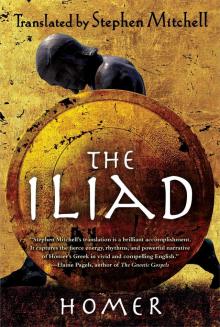 The Iliad
The Iliad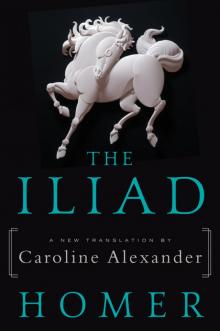 The Iliad (Trans. Caroline Alexander)
The Iliad (Trans. Caroline Alexander)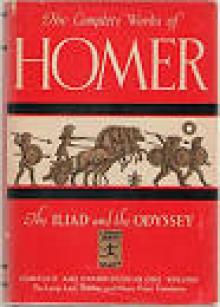 Complete Works of Homer
Complete Works of Homer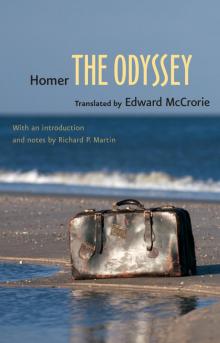 The <I>Odyssey</I>
The <I>Odyssey</I>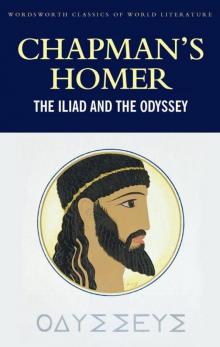 The Iliad and the Odyssey (Classics of World Literature)
The Iliad and the Odyssey (Classics of World Literature)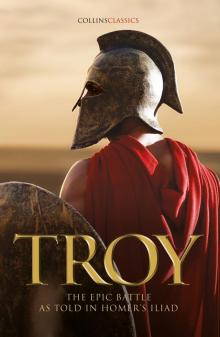 Troy
Troy The Iliad (Penguin Classics)
The Iliad (Penguin Classics)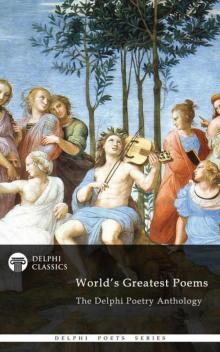 Delphi Poetry Anthology: The World's Greatest Poems (Delphi Poets Series Book 50)
Delphi Poetry Anthology: The World's Greatest Poems (Delphi Poets Series Book 50)